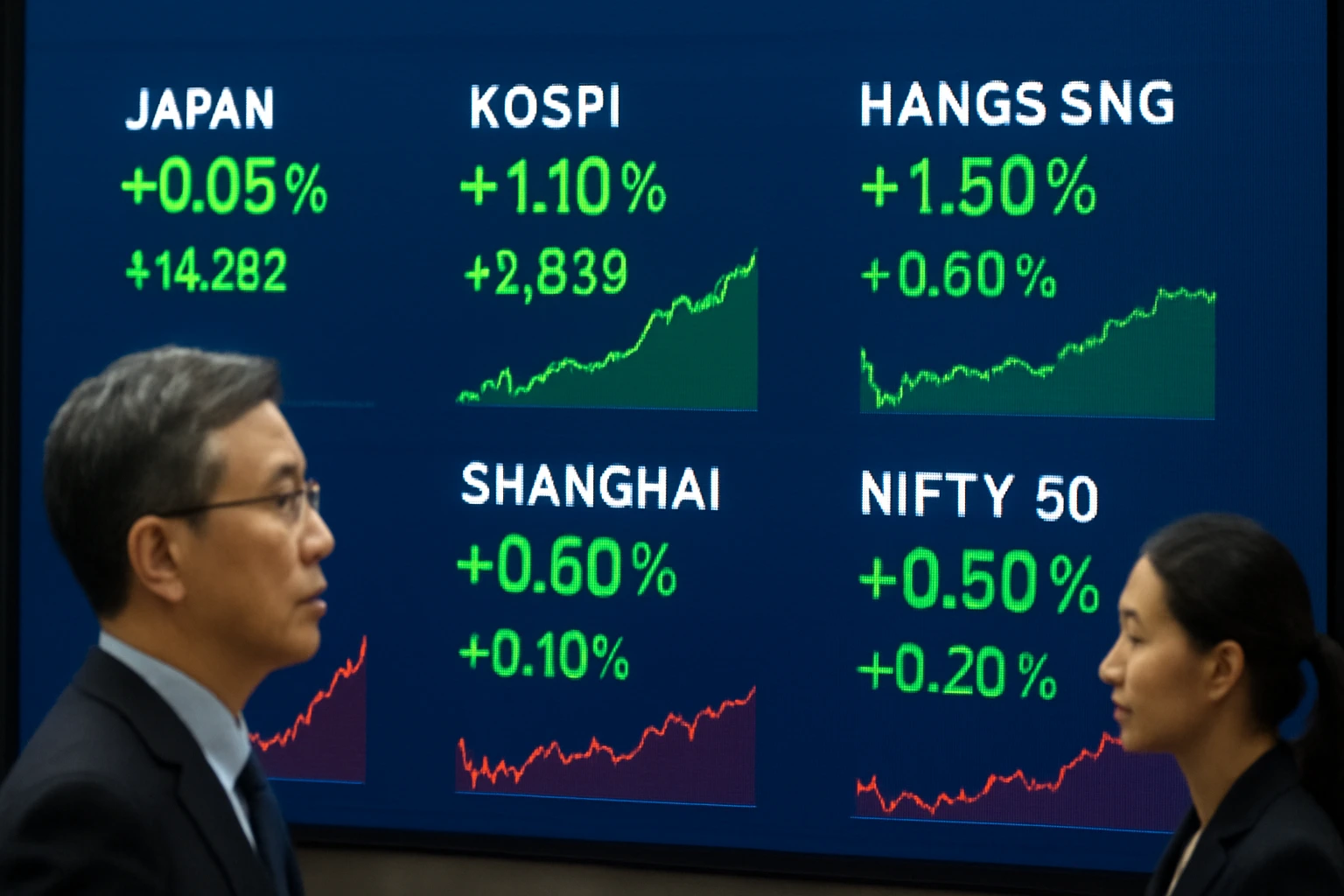Most Asian stock markets advanced Monday as technology shares staged a rebound from steep losses last week, while investors turned their attention to upcoming central bank meetings in Australia and India for policy cues.
Gains in South Korea, Hong Kong and Australia helped lift regional sentiment, tracking modest strength on Wall Street after in line US inflation data boosted hopes for further interest rate cuts by the Federal Reserve. But Japanese markets lagged behind as a stronger yen weighed on export oriented sectors.
The Asia stocks rise came after a volatile week dominated by concerns over global trade tensions, shifting monetary policy expectations and profit taking in high-growth technology names.
Wall Street ended Friday higher after the US personal consumption expenditures price index matched expectations, reinforcing views that inflation pressures are easing. Analysts said the data increased confidence that the Fed will proceed with additional rate cuts this year.
However, investor sentiment remained tempered by fears of a possible US government shutdown later this week and a wave of new tariff announcements that could reignite trade tensions.
Markets are cautiously optimistic, said Liang Chen, chief economist at Pacific Securities in Hong Kong. “The PCE data gave traders breathing room, but concerns about US fiscal uncertainty and global trade frictions are far from over.”
RBA expected to hold rates steady
Australia’s ASX 200 gained 0.8% ahead of the Reserve Bank of Australia’s policy meeting concluding Tuesday. The central bank is widely expected to hold rates steady but could offer signals about future easing, particularly after inflation data showed persistent price pressures.
Inflation in Australia remains sticky, but growth momentum has softened, said Helen Morris, a senior strategist at ANZ. “We expect the RBA to keep the cash rate unchanged this week but prepare markets for a possible 25 basis point cut in November.”
Analysts expect the RBA’s policy rate to settle at 3.35% for an extended period, marking about 75 basis points of cuts since the start of 2025.
In India, the Nifty 50 rose 0.5% in early trading, recovering from last week’s losses driven by trade concerns. The Reserve Bank of India meets later this week and is projected to maintain its benchmark rate while slightly reducing its cash reserve ratio to support liquidity.
The RBI faces a difficult balancing act, said Anuj Patel, an economist at Mumbai based Axis Research. “With growth under pressure from higher US tariffs, some easing is likely, but inflation constraints limit the room for aggressive cuts.”
Regional market performance
Regional markets showed mixed performance, South Korea’s KOSPI rose 1.1%, led by semiconductor stocks. Hong Kong’s Hang Seng Index gained 1.5%, with electric vehicle makers and tech shares advancing.
China’s Shanghai Composite inched up 0.1%, while the CSI 300 rose 0.6%. Singapore’s Straits Times Index added 0.2%. Japan’s Nikkei 225 fell 1.5%, and the TOPIX slipped 0.7%.
In the United States, S&P 500 futures advanced 0.3% during Asian trading hours, indicating mild optimism after Friday’s inflation report.
Technology stocks across Asia rebounded after sharp declines last week fueled by doubts over the sustainability of the artificial intelligence trade and reports of potential new US restrictions on imported semiconductors.
Shares of SK Hynix climbed 3.7%, while BYD Co. gained 1.5% after local media reported the automaker expects exports to account for 20% of global sales next year.
In Sydney’s financial district, investors welcomed signs of stability. The market needed a breather after weeks of turbulence, said Jacob Nguyen, a portfolio manager at Harbour Capital.
Even if rate cuts don’t come immediately, the direction of policy is supportive for equities. In Seoul, local traders said tech sentiment remains fragile despite Monday’s rally.
Chipmakers are recovering today, but investors are still wary of US policy risks, said Kim Soo jin, a trader at Seoul Investment Partners. “If Washington expands semiconductor tariffs, we could see another round of volatility.”
In Tokyo, exporters faced renewed challenges from a stronger yen, which traded below ¥145 per dollar. The currency is moving against us, said Takeshi Sato, who manages a manufacturing export business in Osaka. It’s good for imports, but our overseas sales margins are shrinking.
Investors eye central bank signals
Market analysts said the Asia stocks rise could extend in the short term if central banks adopt a dovish tone and global inflation continues to moderate. However, external risks including trade disputes and fiscal uncertainties in the United States could limit gains.
The next few days will be critical, said Rika Watanabe, Asia Pacific economist at Nomura. Both the RBA and RBI meetings will set the tone for how Asian central banks navigate the balance between supporting growth and controlling inflation.
Investors are also watching for any comments from Bank of Japan officials amid speculation the central bank may tighten policy later this year. A stronger yen has already triggered selling in export heavy sectors, dragging on the Nikkei.
Meanwhile, India’s policymakers face mounting pressure to cushion the economy against US import tariffs that have reached 50% on certain goods. New Delhi’s recent tax relief measures aim to offset some of the impact.
Asian markets opened the week on a firmer note, buoyed by a rebound in technology shares and cautious optimism ahead of key central bank meetings. Yet, persistent global headwinds from trade tensions to currency fluctuations underscore a fragile recovery.
For now, investors are treading carefully, betting that upcoming policy decisions in Australia and India will confirm a gradual shift toward monetary easing as inflation cools and growth challenges emerge.
